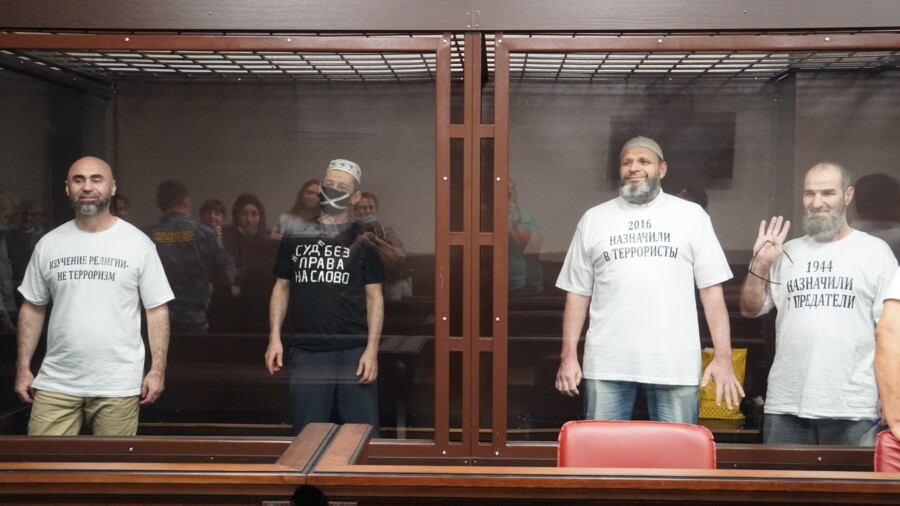Statement by human rights organizations regarding another sentence against Crimean Tatars
On August 16, 2021, the Southern district military court (Rostov-on-Don, Russia) announced another politically motivated sentence that convicted Crimean Tatars to long terms of imprisonment for alleged involvement in the organization “Hizb ut-Tahrir.” Lenur Khalilov and Ruslan Mesutov have been sentenced to 18 years in prison, Ruslan Nahaiev – to 13 years in prison, Eldar Kantimirov – to 12 years in prison.

All four were members of the local Muslim community and took an active part in the religious life of Alushta and its neighborhood. Eldar Kantimirov participated in protests against politically motivated repressions in Crimea, visited victims of searches and trials in politically motivated cases. Eldar had previously been fined, his house had been searched.
In violation of the norms of international humanitarian law, the Russian Federation implements its criminal code on the territory of the occupied Autonomous Republic of Crimea and Sevastopol. In particular, Russia uses anti-terrorism legislation to persecute Crimean Tatars, who are not loyal to the policies of occupying authorities.
An absolute majority of Crimean political prisoners (80) are Crimean Tatars. Seventy-three of them are imprisoned within the “Hizb ut-Tahrir case” (this organization is legal in Ukraine and most countries; however, Russia considers it a terrorist organization). In addition, according to the Russian prosecutors, none of the prisoners prepared or planned terrorist attacks in occupied Crimea or Russia. Probably the only “evidence” of guilt that Russian prosecutors have is audio recordings of personal conversations between the accused, which touch on political and religious topics. In addition, since the imprisonment of the accused, there were numerous recorded facts of violations of their human rights: transfer of the imprisoned outside of the occupied territory, failure to provide them with medical help by representatives of the detention center, prohibition for the use of the native language of the defendants during the court hearings, etc.
We, the representatives of human rights organizations, strongly condemn the persecution and conviction of the four Crimean Tatars. We demand that Russia, as occupying power in the Autonomous Republic of Crimea and the City of Sevastopol:
- Immediately releases Lenur Khalilov, Ruslan Mesutov, Ruslan Nahaiev, Eldar Kantimirov, and all other political prisoners;
- Assures fair trial during the hearing of the appeal claim against the illegally convicted citizens of Ukraine;
- Follows the norms of the international humanitarian law on the territory of Crimea;
- Immediately stops persecution of ethnic and religious groups under fabricated charges of terrorism, extremism, or other fabricated criminal charges;
- Stops the illegal practice of implementation of anti-terrorist and anti-extremist legislation to persecute people in Crimea who are not loyal to the occupying authorities;
- Investigates and brings to justice those who are responsible for politically motivated persecutions in occupied Crimea.
We call on the international organizations and governments of democratic states to:
- Strongly condemn the conviction of Lenur Khalilov, Ruslan Mesutov, Ruslan Nahaiev, Eldar Kantimirov, and all other Crimean political prisoners;
- Provide necessary support to families of Crimean political prisoners that appeared in harsh economic condition due to the imprisonment of their relatives;
- Enforce the diplomatic, political, and economic pressure against Russia to force it to free all Ukrainian political prisoners and to follow its obligations, according to the international law;
- Implement personal sanctions against judges, investigators, representatives of penitentiary institutions, and persons who are responsible for mass violations of human rights in Crimea;
- Demand access to the occupied Crimea for the monitoring missions of the UN, the OSCE, and the Council of Europe, according to the Ukrainian legislation;
- Encourage public persons to get involved in advocacy of issues related to the protection of human rights and the release of Crimean political prisoners;
- Keep the issue of Crimea within the focus of international attention.
NGO “CrimeaSOS”
Center of Civil Liberties
ZMINA Human Rights Center
Crimean Human Rights Group
Ukrainian Helsinki Human Rights Union
Kharkiv Human Rights Group
If you have found a spelling error, please, notify us by selecting that text and pressing Ctrl+Enter.















